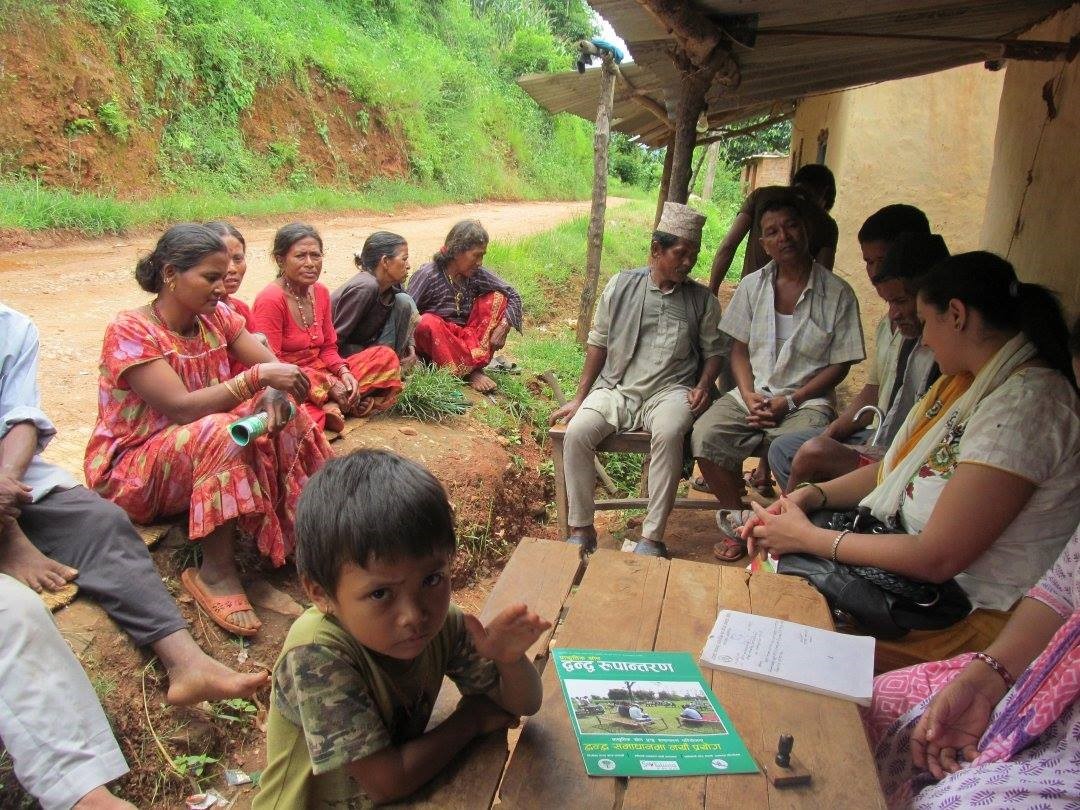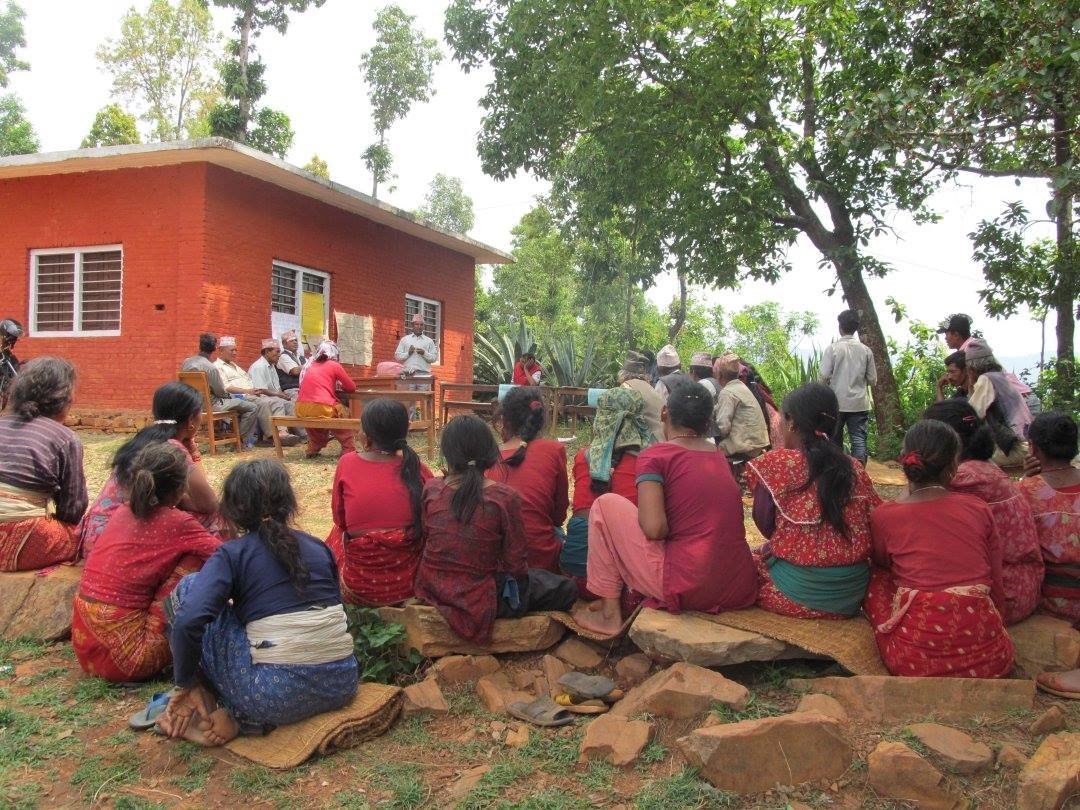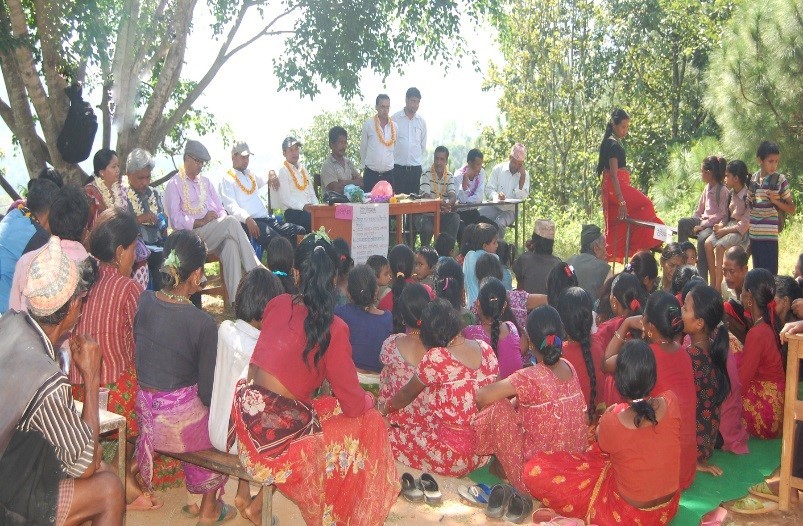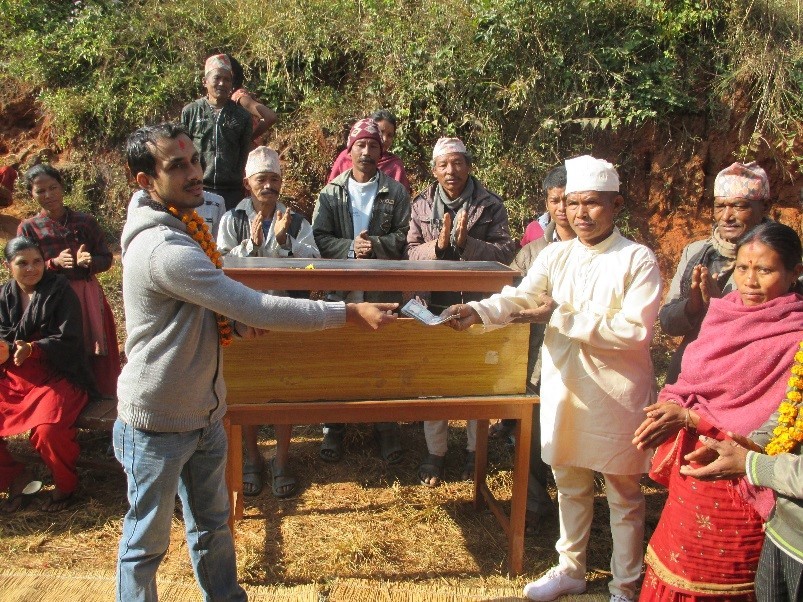1. Background
Ratmate Jhagarpur Community Forest situated at Mahadevsthan VDC 9, Ratmate of Kavrepalanchowk was handed over to the community in 1994. All the users of this users group are from the Danuwar community. While a working committee led by men was jointly overseeing the community forest and Baguwapakha Community Forest, also handed over in 1994, women formed a working committee for Ratmate Jhagarpur Community Forest a few years later following a rise in encroachment in Baguwapakha and uninspiring leadership of the men, and are now overseeing the community forest. The users group sold forest products in 2010. The work plan had stated extracting 65 trees in 2008, 65 in 2009 and 70 in 2010. All the users of the group were illiterate and could not study the working plan. Secretary of the CFUG, Manju Tamang could somehow read and write. Though she insisted that the trees should be taken out as per the working plan and should be stamped by informing the District Forest Office and Mahadevsthan Range Post, the contractor (furniture entrepreneur) argued that trees for quota of three years can be taken out at once and offered to inform the bodies concerned itself if necessary. The contractor (furniture entrepreneur) procured 206 trees at the rate of Rs 500 each by drafting the minute book instead of the secretary. But both the CFUG and the contractor did not inform the Disrtict Forest Office and Mahadevsthan Range Post. The trees were also not cut as per the long-term management concept and were cut from a single space in a way that made cutting the trees and taking them out easier. The local Danuwar community divided the Rs 100,000 received from selling the trees among themselves and procured rice to eat. A few locals later complained at the District Forest Office, Kavre accusing that the group cut trees illegally and the amount received was also misappropriated. The Dstrict Forest Office on the basis of that complaint then directed Mahadevsthan Range Post to investigate the issue. The office-bearers, when called by Mahadevsthan Range Post to Panchkhal for explanation, stated that they did not do anything to complete the necessary process as the contractor had promised to do it, they do not know what should have been done, and conceded that all the users of the group shared the amount as the group did not have a bank account of its own. Mahadevsthan Range Post directed the office-bearers to collect all of that amount and deposit the amount by opening an account in the name of CFUG at Banepa branch of Nepal Bank Limited.
An anonymous complaint was lodged with the Commission for the Investigation of Abuse of Authority (CIAA) in June, 2010 accusing that the trees were cut illegally and the amount received from selling them was misappropriated. CIAA then wrote a letter to the Disrtict Forest Office, Kavre to take necessary action after investigation of the case. The Disrtict Forest Office, Kavre, on the basis of that letter, then froze the CFUG’s current account at the Banepa branch of Nepal Bank Limited and banned the group from doing anything apart from conservation of the forest.
2. Past Efforts for Resolution of the Conflict and their Impact
In 2010, a discussion was held among Mahadevsthan Area Forest Office, Panchkhal, timber contractor, Ratmate Jhagarpur community forest's executive committee and members of Federation of Community Forestry Users' Nepal. The discussion made some decisions like, the users group have to return back the distributed money and deposit it in bank by opening an account and also the contractor should pay more after initially paying just Rs 500 for each tree. But the paper agreement was not implemented and the conflict remained as it is.
3. Procedural Transformation Process
The local Federation of Community Forestry Users, Nepal (FECOFUN), Mahadevsthan and the community forest users group requested FECOFUN, Kavre for facilitating transformation of the conflict when the second phase of the Natural Resource Conflict Transformation Project was in operation. The trained local facilitators (Parmatmaram Parajuli, Rita Manandhar and Bhim Prasad Timalsina) and National Resoruce Person, Ramila Homagain started to work on this conflict by following conflict transformation process since July 2012. Before implementing the conflict transformation process, the facilitators were self-prepared and Planning was done, by holding a meeting of local facilitators and national resource person, about collection of information on the conflicting parties, who should be met first when and how on the basis of the information. After preparation stage, the facilitators did detailed mapping of the conflict, spider team formed, process proposal and common issue were passed with the participation of all conflicting parties and concerned stakeholders. Finally the conflict was transformed on September 13, 2013 by passing common alternatives through joint meeting and all agreed points were successfully implemented by April 2014.
3.1 Conflict Mapping
 Gathering necessary information on conflict from community people during conflict mapping
Gathering necessary information on conflict from community people during conflict mapping
This is a basic step of conflict transformation. The main objective of this step is to clearly understand the conflict from each and every aspect. It focuses on who are the associated parties, what is the issue of conflict and how conflict escaladed. The conflict facilitators, in course of the transformation process, did mapping of the conflict in July-August 2012 using 3P process called so as detailed information about the people, process and problem was collected in the process. People means the parties to the conflict, problem refers to the subject of conflict, and process tells about how the conflict manifested during the mapping of conflict
A. Parties to the Conflict
a) Ratmate Jhagarpur Community Forest
b) Local timber contractor
c) District Forest Office, Mahadevsthan Range Post
B. Individual or Party Who Can Affect the Decision
a) District Forest Office, Mahadevsthan Range Post
b) CIAA
C. Parties Affected by the Decision
a) Ratmate Jhagarpur Community Forest Users Group
b) Local timber contractor
4.2 Spider Team Formation
Separate meetings were held with all conflicting parties at different times to know past resolution practices and their perception regarding conflict. The community members were also informed on conflict transformation process and looked for probable spider among community members. The impartial, transparent and participatory procedure was carried out for the conduction of separate meetings.
The Spider team “Kwati Group” was formed by including all conflicting party’s representatives who are, dedicated, impartial, trustworthy and social hearted people, who could spare time for the community. Spiders' creat suitable environment for talk as well as discussion with conflicting parties and also play facilitators role in conflict transformation process. Search for the individuals, who can help in conflict transformation, was done after mapping of the conflict and three membered spider team was formed to help in conflict transformation. After the formation of spider team, a 2 days' long spider team capacity building workshop was organized to clarify spiders about the concept of conflict, demand vs desire in a conflict, their role and responsibility in transformation process and also discussed on qualities required to act as a facilitator. The spider team selection and their capacity building took a along time starting from September 2012 to February 2013. The seleted spider members participated in the workshop are as follows;
|
S.N.
|
Name of the Spider Member
|
Party to the Conflict/Stakeholder
|
|
1.
|
Hira Rai
|
Ratmate Jhagarpur CFUG
|
|
2.
|
Anoj Poudel
|
Local timber contractor
|
|
3.
|
Shyam Sundar Sapkota
|
District Forest Office, Mahadevsthan Area Forest Office
|
4.3 Process Proposal
All parties to the conflict must agree on the transformation process for conflict transformation with an improvement in relationship. The perspectives of conflicting parties on process proposal, were gathered through separate meetings and group discussions. The gathered perspectives from parties to the conflict were noted down and the spider team and local facilitators prepared draft of it. This prepared draft was again taken to all parties for consultation and finally the agreed draft was passed through a joint meeting in March 2013.
Passing of process proposal is significant as it provides a common ground for all conflicting parties to learn how the conflict transformation process will be implemented in the coming days, when, where and how the meetings and discussions will be held; this type of understanding is important to develop faith in the process which is crucial for successful transformation of any conflict. The process proposal was passed in the presence of all conflict associated parties, stakeholders, political party reporesentatives and NRCTC-N members. Certain rules were made to systematize the joint meeting and Khat Method was used to lead the discussion in right track and create justice to each conflicting party –which in turn plays an important role in reaching agreement in conflict transformation process. In the Khat method, each conflicting and concerning party sit behind the Khat and separate Khats are also managed for the facilitator and monitoring unit. Two representatives from each party sit in each Khat and representative sitting in the Khat can only allowed to speak in the favor of their parties. If person sitting behind the khat wants to speak then person in khat should be replaced by them to speak. The person of each conflicting party should have to wait for their turn and can speak only in their turn. Spider members always remain behind the Khat as a volunteer to aware people about the rules.
The joint meeting passed following points of agreement on process proposal.
- All parties should behave and talk in a civil manner in all the meetings conducted under natural resource conflict transformation process.
- All parties should actively participate in meetings and discussions held under natural resource conflict transformation process.
- The spider team will be impartial and it will not discriminate people on the basis religion, language, caste, political affiliation etc.
- The date, time, venue, chairperson, chief guest and other guests in the joint meeting will be decided in a participatory way in all agreeable terms.
- The joint meetings will be organized through Khat
- All concerned parties and stakeholders should not be involved in activities that could aggravate the conflict during the conflict transformation process.
- Natural resource conflict transformation process will be carried out in an impartial, transparent, participatory, inclusive and judicial way.
- The joint meeting under natural resource conflict transformation process will be conducted in public places only.
- Conflict transformation process will help to create a win-win situation.
- While carrying out the natural resource conflict transformation process, activities and decisions conflicting with the prevailing laws will not be taken.
- All parties should express their opinions freely in meetings and discussions.
- While working through the conflict transformation process, if any new problems or developments linked with the conflict is seen, then the spiders or facilitators should be immediately informed about it and all parties should help however they can to resolve that issue.
- All parties should be informed about the action plan of spider team and any new information from the stakeholders.
- All parties should strictly follow the norms and values.
- All political parties should support in natural resource conflict transformation process.
4.4 Common Issue
 Discussion on common issue draft
Discussion on common issue draft
The facilitators spent two months, April and May 2013, on this step of conflict transformation process. The spider team along with local facilitators gathered perpectives of conflict associtated parites on issues through meetings and discussions. After gathering of perspectives on issues, the draft of the common issue was prepared through a meeting of the team assisting for transformation of the conflict by including the issues coming from the parties to the conflict. The draft was again discussed among conflicting parties and finally passed through a joint meeting held in the presence of all parties, government and non government officials and political party representatives. Khat Method was used to systematize the meeting. The open discussion was held on draft of common issue among the participants of joint meeting and finally following common issue was passed unanimously.
"How can the community forest be brought to a state of good governance by withdrawing the CIAA case and suspension by the District Forest Office, and conserving the forest and putting it to good use, and how can the relation at the people’s level be improved by ensuring financial cooperation between the contractor and the community forest committee?"
4.5 Common Alternatives
The next step after passing the common issue is to gather perspectives from parties on alternatives based on common issue. The facilitators' gathered prespectives of conflicting parties on common alternatives in June and August 2013. The spider group members and local facilitators went to CIAA to discuss about the case before preparing the draft on common alternatives. The CIAA told that District Forest Office can unfreeze the bank account, if deemed right, by monitoring the present state of the community forest as the District Forest Office has already been written to take the necessary action on the basis of loss to the community forest.
 Participants of joint meeting organized to pass common alternatives
Participants of joint meeting organized to pass common alternatives
The spider group then prepared the draft for common alternative and District Forest Office also completed monitoring of the community forest. After holding discussions with all the parties about the common alternative so prepared, the joint meeting was held on September 13, 2013. District Forest Officer, Ganesh Raya was the chief guset of the meeting chaired by Nirumaya Thing, Treasurer of NRCTC-N. The agreement letter was signed by all conflicting parties after rigorous discussion on common alternative points. The joint meeting has passed following six points of agreement.
- All the parties will take initiative to generate aid from the organizations and government bodies in the district to make the community forest that has been conserved by the community forest users group for the past three years, greener.
- The District Forest Office will unfreeze the bank account in the name of community forest and inform that the forest has been opened for conservation, promotion and use.
- To work by changing the bank account in the name of thecurrent working committee and to continue to conserve and promote the forest and put it to good use.
- The contractor will take initiative to generate aid from the organizations and government bodies in the district to make the community forest greener.
- The contractor will pay Rs 15,000 and provide a table and two chairs to the community forest for office use.
- Spend the amount of Rs 15,000 received from the contractor for conservation of the forest and bring the table and two chairs into use by opening an office of the community forest.
5. Agreement Implementation
All points of the agreement were successfully implemented;
- The District Forest Office, Kavre has already unfrozen the bank account and issued a letter permitting the users group to use the forest on the day the joint meeting was held to pass the alternative.
- The group formed a new working committee on the same day and has already started to operate the bank account from September 26, 2013 in the name of president, treasurer and secretary.
 Timber contractor providing NRs 15,000 and some furniture to CFUG
Timber contractor providing NRs 15,000 and some furniture to CFUG
- Similarly, the group has already established an office by making arrangements for providing Rs 500 per month for office operation.
- The contractor has already paid Rs 15,000 to the community forest and provided a table and two chairs for office use.
- The work plan of Ratmate Jhagarpur CFUG was also prepared by the support of multistakeholder forestry program operated under FECOFUN and submitted to district forest office. After the approval from district forest office it was handed over to the CFUG.
5. Changes Evident in the Society
Process: The community after one and half years of discussions during the conflict transformation process now feels that such problems should be resolved through dilogues. The group has reformed its old working style and takes decisions with participation of everybody by holding discussion with everyone to ensure that the unintentional mistakes of the past are not repated. Transparency, participation, participatory leadership, trust, inclusion and equality have been established as core value in all community activities. Only the major persons of the users group, especially the office-bearers used to participate in the conflict resolution process before the start of conflict transformation process. But all the decisions have been taken with participation and discussions of all the users of the users group once the transformation process started. The executive committee also includes women, men and even youths now and not just the women. Now the culture of dialogue has been started in the community.
|
The forest staffers used to threaten to jail us for cutting the trees while coming to the village earlier and would not provide necessary help. But they have helped a lot in resolving the dispute while coming to the community forest together with the spider group. We find a huge difference in their behavior toward us.
Manju Rai Danuwar, former secretary of the Ratmate Jhagarpur Community Forest.
|
Content: The District Forest Office had frozen the bank account of the community forest and banned use of forest products after a complaint was filed with CIAA due to the dispute about cutting trees. Similarly, there was also an accusation that the contractor had landed the users group in trouble by cheating the impoverished women and procuring the trees at a cheap rate. But the transformation process has helped in resolving the issue. The District Forest Office after monitoring of the community forest has unfrozen the bank account and given permission for use of forest products after CIAA stated that the District Forest Office can take a decision about whether to allow use of forest products by the users group by considering the situation at the place.
|
Photo: The Ratmate Jhagarpur CFUG honored NRCTC-Nepal for creating peace by transforming their conflict and supporting in Forest Conservation and Management.
|
The main issue of this conflict—freezing of the bank account of the community forest and ban on use of forest products after filing of a complaint at CIAA—has been resolved now. A new executive committee has now been formed for conservation, promotion and use of the forest while the frozen account has also came into operation.
The contractor has already provided cash of NRs 15,000 and a table and two chairs for institutional development of the community forest feeling that the community forest landed in trouble as he committed a mistake in procuring the trees at a cheap rate and took them without completing due procedures.
The practice of ensuring equal participation of everybody in all the decision making processes and presenting financial details of the organization every month has staretd after the conflict transformation process.
Institutional development activities have been carried out in CFUG and the District Forest Office has also provided forest management taining to CFUG after conflict transformation.
|
Our relationship had not deteriorated much even earlier but it has definitely improved now. It has improved due to repeated meetings and staying together. The relationship has improved as I managed to fulfill their hopes.
Anoj Poudel, timber contractor
|
|
The timber contractor did not use to talk properly with us earlier and used to turn away from us while crossing our ways. He would promise to come when we invited him to come to talk about the dispute but would not come. He now greets me calling me sister-in-law when he sees me in the way and asks about my well-being.
Rita Danuwar, users of the Ratmate Jhagarpur CFUG
|
Relationship: Users of the Ratmate Jhagarpur Community Forest, timber contractor and the Area Forest Office earlier used to accuse one another and did not openly talk with each other. But their behavior now has been changed. They talk among each other, respect one another and assist others now. They become well wishers in wedding ceremomey when alive and back support in funeral when dead. Most importantly peace has been established and it has casted the new rays of hope in their life.
